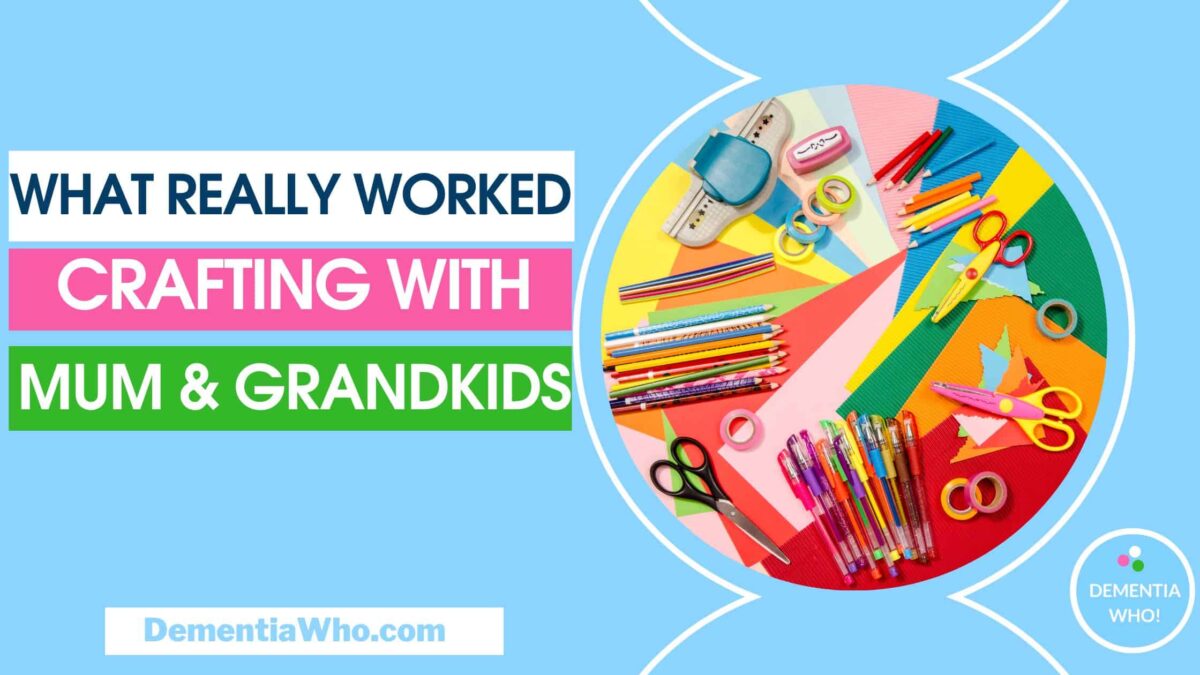It’s challenging to respond to the same question over and over again. The constant repetition can be mentally and emotionally draining. That’s why it’s important as dementia caregivers to build up strategies for handling repetitive questions in dementia care. In this article, we’ll be looking in depth at how to handle repetitive questions in a compassionate and supportive manner.
Repetitive questions from loved ones with dementia can often be because of underlying needs or discomforts, cognitive decline and memory loss, which could mean that they’re unable to articulate their needs and repetitive questions are a way of communicating that not all is well.
Related: For causes for repetitive questions, read this article ‘Why Does My Mum With Alzheimer’s Keep Repeating Herself? and for help in answering questions check out 12 Most Common Dementia Repetitive Questions and Suggested Responses’

Below are common triggers/underlying needs and strategies for handling repetitive questions to help prevent or reduce these questions.
Emotional Needs
Anxiety and fear can prompt repetitive questions, especially where you may not feel safe or secure. Anxiety over the unknown, fear from confusion can lead to repetitive questions as your loved ones tries to make sense of their circumstances. So, to help:-
| Provide Reassurance | Offer consistent reassurance and comfort to alleviate anxiety and reduce the frequency of repetitive questions. Use comforting words, gentle touch, soothing gestures to convey they are loved, secure, and safe with you. Your loved one may feel vulnerable from a loss of control or autonomy over their own lives. Look out for what could have triggered the feelings and remove it. |
| Change the focus | Guide the conversation to different topics or use question to dive deeper and talk around the subject of the question. Ask them about a loved one, ask them to tell you more, what they did, where they lived, how they met, etc. begin to reminisce with them to happy times. Talk to them and reassure them, use their life stories, hobbies, topics you know they are passionate about. Use activities, crafts,music etc. Music has a powerful impact on loved ones with dementia and can help stimulate memory and evoke positive emotions. Play a favourite song or sing a favourite tune to engage your loved one. |
| Use comforting objects | To bring comfort, use sensory or tactile objects to calm and reduce stress. We have a fidget cushion/blanket. You can make them or buy them. Dementia dolls can be comforting, or you can dig out old favourite photos of the family, friends or places they’ve been. |
| Boost Morale | Your loved one may feel a loss of identity or self-worth as their cognitive abilities decline. Reaffirm identity and worth through praise and encouragement. Engage in activities that focus on their strengths and skills to boost feelings and reduce insecurity. Praise their skills, so they take up opportunities for autonomy and decision-making if they’re plagued by self doubt. |
| Acknowledge what they’re feeling | Use words & touch, tell them you understand how they feel and you’re there to help them. Comforting & emphatic responses can help alleviate their worries, being there for them, reassuring them even when it feels absurd. It’s important for your loved one not to feel alone or misunderstood, as that can give rise to repetitive questions. |
Cognitive Impairment & Memory Loss
Cognitive impairment can lead to issues in processing and retaining information, leading to frustrations & stress that can manifest into repetitive questions. It affects everyone differently. To support our loved ones, we can:-
| Stay Calm and Patient | Remaining calm in the face of repetitive questions can be extremely difficult. Remember that the person with dementia may not find the right words or be able to retain information, so we need to respond with empathy, calmness, actively listen and give them time to process information. |
| Don’t Argue or Correct | Instead, take a deep breath, regroup, be patient, and respond calmly. Watch your body language, try to speak in a soothing tone, speak slowly & clearly to minimise any anxiety and let your loved one know that they are secure with you. It can make the world of difference to their wellbeing. |
| Using Simple and Concise language | Use clear and concise language, avoiding jargon or technical terms. By simplifying your responses, you can help your loved one with dementia understand you better and retain information. Avoid overwhelming the person with too much information at once. Allow sufficient time for the person to process information and respond |
| Repeat information | It’s not just your loved one that might need to repeat information, you can also help your loved one understand and retain information better by repeating things for it to be clearly understood. |
| Avoid displays of frustration or impatience | Respond with a gentle and reassuring demeanour to prevent escalation of anxiety or confusion. Imagine your loved one’s frustration in trying to communicate to you and how it might feel when you’re not being understood! Make sure your body language, gestures and facial expressions also convey understanding and empathy, not frustration or impatience. Anyone showing frustration or impatience will make your loved one more anxious. |
| Reminiscence | Redirect attention by talking about past events or shared memories. This can help shift focus away from repetitive questioning and create meaningful connections through storytelling. |
| Use Technology | Virtual assistants, like Amazon Alexa or Google Assistant, can be really helpful in managing repetitive questions. Caregivers can program these devices with recorded responses to commonly asked questions, allowing your loved one with dementia to get immediate and accurate information without unnecessary repetition. You can also use dementia clocks, or digital photo frames with messages for your loved one. Here are two short videos on how to create answers to commonly asked question for Alexa click here & for Google devices click here. You just type out your question and then the answer you want as a response using the instructions in the videos. |
Environmental Needs
If your loved one is exposed to unfamiliar, loud & noisy environments, spaces that are unfamiliar to them or hard to find, then they can experience confusion, or feel overwhelmed and repetitive questions about their location or going home may all be because of the environment. What we can do as dementia caregivers is ensure that they have a supportive, calm, reassuring space by doing the following:-
| Declutter | Minimising clutter and simplifying the surroundings to make things easier to find can help reduce confusion. Keeping the environment clean, organized, and free of unnecessary distractions can provide a more peaceful and calming atmosphere. Simplified surroundings can minimise anxiety and frustration, leading to a decrease in repetitive questioning behaviour. |
| Minimise background noise | If you’re in an environment where there is a lot of hustle and bustle, loud noises surrounding your loved one, they may feel overwhelmed by the situation either move to a quieter place and see if that helps or reduce the noise in the environment if possible. |
| Make the home familiar | Personalizing the living spaces of loved ones with dementia. This can contribute to a sense of familiarity and promote a calming environment. Fill the space with treasured item, cherished photos, and meaningful decorations to create a space that feels safe, comforting, and reminds them it’s their home. |
| Soften the room | Discuss whether to redecorate the room with your loved one to make it more comfortable and calming, whether they would like to change it to their favourite colours, patterns, or themes. Use soft lighting and gentle background music to create a soothing atmosphere. Anything that will increase comfort could resort in less repetitive questions. |
| Remove them from the environment/ Remove triggers | Change the environment, get out and about, go for a walk, take a drive, engage in physical movement or remove the trigger – is there something in their surroundings that triggered this, something on TV, people or objects around your loved one? Remove items that can be misinterpreted or mistaken for something upsetting. |
| Use visual cues | Incorporate visual aids such as pictures, charts, or calendars to reinforce information and redirect attention. Label items, use sticky notes and pictures. For instance, you can use a whiteboard with messages, details of the day’s plan, include upcoming events. |
| Routines | Changes in routine or unfamiliar situations can trigger anxiety and confusion, prompting repetitive questioning. Establishing predictable routines can provide your loved one with dementia with a sense of structure and familiarity. Routines can be established for activities such as meals, personal care, and recreational activities, providing a framework that your loved one with dementia can rely on and provide reassurance through structure. By sticking to consistent daily routines, dementia caregivers can help reduce unpredictability and minimise confusion. |
Physical Comfort and Well-being Needs
Looking for that underlying need also means addressing any physical discomforts to help alleviate agitation and reduce the frequency of repetitive questioning. Just like you, if you’re in any discomfort or pain, then it will be expressed in some form, like repetitive questions. So making your loved one as comfortable and pain-free as possible is another way to improve their overall well-being and reduce repetitive questions.
| Address Basic Needs | Ensure hunger, thirst, warmth, clothing etc. are not contributing to the repetitive questions. If your loved one isn’t comfortable, do what you can to improve and address that and see if that makes a difference. |
| Toileting Needs | Are they able to independently use the toilet, ensure the path to the bathroom is clear and recognisable to your loved one? Label the bathroom or leave doors open so that they can be visually seen. Support them or provide mobility aids if needed. Is support needed in the form of incontinence products, or are they dealing with constipation or an upset stomach? All can contribute to discomfort that is expressed through repetitive questions in dementia. |
| Pain Management | Check for signs of discomfort, look for body language clues, touching one area, grimacing, irritation. Talk to your loved one and ask whether they’re in pain. Make sure their medications are being taken and taken on time. Check with them if any physical activity is within their personal limits & they’re not over pushing themselves. Dental pain is a key one that can easily be missed. Look for body language clues and where needed refer to a doctor. |
| Monitor Medications | Review the individual’s medications with your doctor to identify any potential side effects or interactions that may contribute to repetitive questioning, especially if there is a marked change after a dosage change or new medications being added. |
Social Needs
Social interaction and meaningful relationships are vital for your loved one’s emotional health and well-being. Feelings of frustration, boredom, or a lack of social interaction can present as repetitive questioning
| Encourage your loved one to join social groups | Explore local support groups or day programs tailored for your loved ones with dementia to promote social connections outside the home environment. |
| Involve Family in Care | Involve family members in the caregiving process and encourage them to participate in activities or outings with your loved one with dementia |
| Provide Emotional Support | Practice active listening and empathy during conversations, validating their feelings and concerns without judgement. Offer physical gestures of comfort, such as holding hands, giving hugs, or sitting close, to convey emotional support and reassurance. |
| Maintain Relationships | Stay in touch with family members and friends through phone calls, letters, or video chats. Set up video calls or virtual meetings with distant relatives or friends using platforms like Skype, Zoom, or FaceTime to maintain connections and reduce feelings of isolation. Late afternoon and early evening could be a good time to combat sundowning and distract from repetitive questions. |
| Create Memory Aids | Create a digital photo album or memory book featuring photos and videos of family members, friends, and memorable events to evoke positive memories. You can use this to evoke happy memories and discussions about their life that again can distract from repetitive questions. |
| Engage in activities | Add in stimulating activities, as these can make a significant difference in managing repetitive questions. Engaging your loved ones with dementia in activities that they enjoy, like arts and crafts, music therapy not only helps divert their attention but also promotes cognitive stimulation and emotional well-being. Encourage them to participate in sensory-based activities, such as playing calming music, looking at photo albums, or enjoying a soothing hand massage |
Dementia caregivers can try these strategies for handling repetitive questions but don’t get upset if they don’t work. One thing I’ve learnt is not everything works. You can read as many guides, watch videos, talk to other dementia caregivers and sometimes things still don’t work, or they work temporarily. My mum regularly goes through repetitive questions, and sometimes I can help soothe her, other times I can’t. Don’t blame yourself, it’s nothing that you are doing. We can only do our best.
I do know if the situation got worse where mum got extremely distressed, I would talk to mum’s dementia adviser at the memory clinic or her doctor for more advice or speak to helpline like Alzheimer’s Society or Dementia UK Admiral Nurses.
And finally, don’t forget to take care of yourself and take breaks too. You’re no good to your loved one if you burnout or develop health issues because of your own stress levels.
P.s Don’t forget to LIKE and let me know if you found this article useful and want further information on this subject!
Silent Tears – The Quiet Grief After Losing A Parent
Quick Dementia Activities Using what’s At Home
What Really Worked: Crafting with Mum and Grandkids!
Hired After Caregiving: How I Landed a Job in 10 Days!
Mess Free Painting Dementia Activity – Water Painting With Reusable Books!
The Finger Painting Kit That Made Dementia Days Easier!
Small Grief Rituals That Helped After My Mum Died
No-Sew Crafts for Dementia That Actually Work – No Needles, No Fuss!
Handling Constipation in Dementia Care: What Actually Helped
Painted Wooden Coasters – A Fun, Relaxing Craft for Dementia Care












